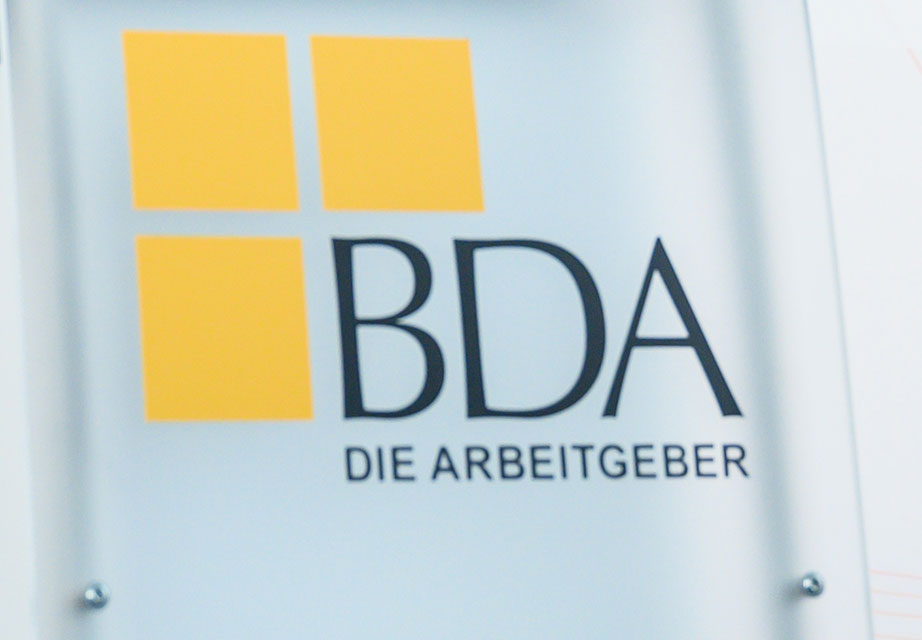- TOPICS
-
-
- Employment and Labour Market
- Labour law and collective bargaining policy
- General applicability
- Industrial action
- Labour & collective bargaining law
- Working time
- Time limit
- Works Constitution
- Bureaucracy reduction
- Data protection
- Protection against discrimination
- Parental leave
- Posting
- Insolvency
- Protection against dismissal
- Minimum wage
- Co-determination
- Mobile work
- Maternity protection
- Pandemic
- Care time
- Self-employment
- Tariff autonomy
- Collective Bargaining Agreement
- Collective bargaining unit
- Tariff policy
- Collective bargaining
- Collective agreement
- Part-time work
- Restructuring
- Holiday law
- Contracts for work
- Whistleblowing
- Temporary work
- Education and vocational training
- Training market
- Professional orientation
- Education policy
- Education 4.0
- Dual education
- dual study
- Permeability
- Early childhood education
- Higher Education Funding
- Lifelong learning
- Teacher Education
- Reorganization of education and training
- STEM Professionals
- Economic education
- Accreditation/Quality assurance
- SCHOOLBUSINESS Germany
- Digitalization and innovation
- Europe and International Affairs
- Social policy and social security
- Old-age poverty
- Work made in Germany
- Occupational safety
- Contribution and registration law
- Company pension scheme
- Shortage of company doctors
- Health insurance
- Long-term care insurance
- Mental health
- Pension insurance
- Riester pension
- Social self-government
- Social insurance
- Accident insurance
- The future of social security
- Taxes & Finances
- Economy & Society
-
-
-
- Newsroom
- The BDA
- Members

Full working time recording in trust-based working time models - not a model of tomorrow

BDA AGENDA 3/23 | COMMENT OF THE WEEK | February 9, 2023
Dr. Michael Niggemann, Member of the Executive Board for Human Resources and Infrastructure
and Labour Director of Deutsche Lufthansa AG
A modern working time framework must be geared towards the requirements of the German economy and increasingly diverse job profiles. The abstract objectives of the 1994 reform should also apply today: "The draft law is intended to […] improve the framework conditions for flexible and individual working time models." This must continue to be the standard for implementation today.
The reasons for the BAG's decision on working time recording published a few weeks before Christmas have created uncertainty for companies in practice, also with regard to the legislative activity envisaged in this context. This applies in particular to employees who do not work according to duty and shift schedules or with traditional working time recording. At Deutsche Lufthansa AG, this is one in four ground employees. There is a threat here of encroachment on existing and justified freedoms. This roughly corresponds to the proportion of employees in Germany who regularly work remotely or from a home office. These are often employees who are largely able to organize their work content independently and in a results-oriented manner.
In this respect, the BAG ruling is in line with the reality of companies, which has been characterized by a variety of collective regulations on trust-based working time models for decades. The "trust" in these models not only means that employees are largely free to decide when they perform their work, but also that the employer refrains from controlling their working hours. The positive effects and opportunities of these working time arrangements for employees and companies must be preserved. These models require a legal framework that moves away from "one-size-fits-all" prohibitions towards differentiated possibilities and opportunities for organization, thus recognizing the requirements of different forms of work. Many activities can be directly substituted by the next shift after the end of one shift. This does not apply to work that is primarily based on thought processes - these cannot be transferred from one employee to another by "cutting them out". This also goes hand in hand with the shift from time-based to results-oriented work performance. Sensible occupational health and safety must also serve this reality. The aim must be to ensure protection where necessary, but also to grant flexibility and personal responsibility where possible.
Other European countries have done this on the basis of the EU ArbZRiLi. For example, the Dutch legislator has linked exceptions to the recording of working hours to remuneration that exceeds the national minimum wage by a factor of three. Such an implementation is pragmatic and the demarcation is simple.
In this respect, the German legislator is also required to make use of the flexibility of the European guidelines when it comes to the exceptions to the recording of working time. For example, Art. 17 of the EU Working Time Directive provides an opening for "persons with independent decision-making powers".
According to the coalition agreement, employees should be granted such autonomous decision-making powers if and to the extent that they are able to work on a mobile basis as part of their job. They should have a justiciable right to discuss mobile working with their employer. Accordingly, these employees should not be subject to a strict and narrow administrative regulatory framework with regard to the monitoring and documentation of working hours.
Politicians are called upon to act stringently here. Anyone who advocates the right to discuss the place of work must also grant optionality in the (control of) working time. Working time and place of work as core areas of employment law must correspond in this respect. More freedom must be combined with more personal responsibility.
The increasing tendency towards an asymmetrical distribution of rights for employees on the one hand and obligations for employers on the other should be limited, at least where European regulations expressly allow openings for differentiated regulations. In this context, the rigid maximum daily working hours must urgently evolve into a maximum weekly working time. Germany will only remain attractive as a business location in European and global competition in the long term if it has a flexible labor law framework.






